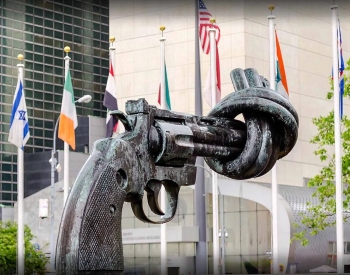Following the opening statements provided by the High Representative for Disarmament Affairs, numerous nations and coalitions delivered statements highlighting their positions on key issues and emphasizing their top concerns. As expected, nearly every nation that delivered a statement condemned the Russian invasion of Ukraine, vowing to stand up against these actions. The European Union quoted EU Special Representative Joseph Borrell:
“These are among the darkest hours for Europe since World War II …. This is not only the greatest violation of international law, it is a violation of the basic principles of human co-existence. It is costing many lives with unknown consequences ahead of us.”
In similar nature, the United States criticized Russia for their merciless invasions of Ukrainian cities, reckless threats of nuclear conflict, and widespread amounts of disinformation regarding their chemical and biological weapon usage. US Speaker Ms. Bonnie Jenkins continued, declaring that “Russia has deliberately chosen the path of war and destruction” by neglecting to respect international laws and ignoring the global harm that comes with the use of weapons of mass destruction.
The failed ratification at the 10th Review Conference of the Nuclear Non-Proliferation Treaty (NPT) in August was also brought to attention by numerous nations. Nordic countries expressed “deep regret” in response to Russia singlehandedly blocking this treaty from reaching consensus. South Africa was another nation who provided remarks:
“This lack of consensus, marking twelve years of failure, is a stark reminder of the lengths nuclear-weapon States are willing to go…to put their selfish narrow interests ahead of the collective peace and security of the rest of humanity.”
The United States attempted to change the narrative surrounding this conference, denying that it was a failure. The fact that 150 countries came to agreement was a display of unity and a remarkable demonstration of the support for the NPT, so Ms. Jenkins explained. She argues that “this was not the failure of the treaty or even its political process — it was the action of one state.”
Undeniably, the Russian-Ukrainian conflict was introduced the most frequently, highlighting a deep concern for the ongoing issue, its impacts on regional civilians, and the effects it imposes upon the world as a whole. Other shared concerns were presented, as the Central American Integration System (SICA) and the Caribbean Community (CARICOM) both discussed small arms and light weapons trade, elaborating on its role in transnational organized crime.
Furthermore, the Nordic Countries called on all UN Members to join the Arms Trade Treaty and also encouraged further development towards the protection of civilians from explosive weapons in populated areas (EWIPA). This is an ongoing affair that must urgently be addressed, as we continue to see widespread global impunity surrounding the use of EWIPA. Going forward with the First Committee’s discussion, it is expected that this array of matters will be distributed throughout debates and discussions, hoping to produce impactful resolutions.
by Nicole Piusienski







